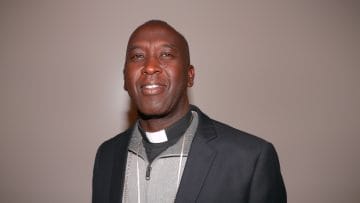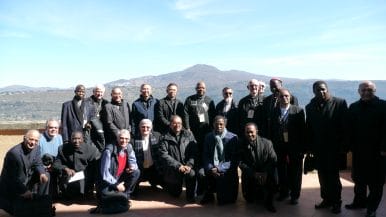 Our diocese of Lodwar – Bishop Dominic Kimengich recounts – is situated in Turkana County (Kenya), bordering with Uganda, South Sudan and Ethiopia. It is 700 km away from Nairobi. The travelers who come to us have to ensure that there is a police escort along the route, so as not to encounter bandits and robbers in the frequent raids. Due to climactic changes, it has not rained for a long time, with the terrible consequence of the shortage that has affected the entire Turkana area. Sixty percent of the population still live the nomad lifestyle and up to now have survived by raising camels, sheep, goats, donkeys and cattle. Now that there is no food or pastures for the cattle, they are forced to migrate to nearby countries. Given that this is a zone of confines, the many conflicts between bordering tribes battling for survival provoke the death of many innocent people, among which are women and children. In the diocese we have a huge refugee camp called Kakuma, with almost 200,000 refugees coming mostly from South Sudan, where the situation is worsening each day. But many also come from Somalia. We find ourselves in a very difficult situation since not even the inhabitants of Lodwar have enough food and water. Many children have even stopped going to school for lack of food. In 1985 when I was in the seminary, someone told me about the Focolare spirituality, but once a priest I was assigned to a parish where it was difficult to keep in contact with the Movement. It was only when I became a Bishop that I was able to attend some meetings in Nairobi. In 2012, to celebrate the 50th year of evangelisation, we thought of inviting the bishops of the surrounding dioceses: Uganda, South Sudan, Ethiopia and other four dioceses in Kenya, to speak about peace and reflect on what we can do. Ten Bishops attended and we got together for three days, a meeting which is now held every year. We can say that every time we would meet, the conflict was reduced. Once I went to visit Bishop Markos of Ethiopia, who is also present in this congress and from the unity built also with the other bishops, we find the strength to bring ahead our ministry in such a troubled land.
Our diocese of Lodwar – Bishop Dominic Kimengich recounts – is situated in Turkana County (Kenya), bordering with Uganda, South Sudan and Ethiopia. It is 700 km away from Nairobi. The travelers who come to us have to ensure that there is a police escort along the route, so as not to encounter bandits and robbers in the frequent raids. Due to climactic changes, it has not rained for a long time, with the terrible consequence of the shortage that has affected the entire Turkana area. Sixty percent of the population still live the nomad lifestyle and up to now have survived by raising camels, sheep, goats, donkeys and cattle. Now that there is no food or pastures for the cattle, they are forced to migrate to nearby countries. Given that this is a zone of confines, the many conflicts between bordering tribes battling for survival provoke the death of many innocent people, among which are women and children. In the diocese we have a huge refugee camp called Kakuma, with almost 200,000 refugees coming mostly from South Sudan, where the situation is worsening each day. But many also come from Somalia. We find ourselves in a very difficult situation since not even the inhabitants of Lodwar have enough food and water. Many children have even stopped going to school for lack of food. In 1985 when I was in the seminary, someone told me about the Focolare spirituality, but once a priest I was assigned to a parish where it was difficult to keep in contact with the Movement. It was only when I became a Bishop that I was able to attend some meetings in Nairobi. In 2012, to celebrate the 50th year of evangelisation, we thought of inviting the bishops of the surrounding dioceses: Uganda, South Sudan, Ethiopia and other four dioceses in Kenya, to speak about peace and reflect on what we can do. Ten Bishops attended and we got together for three days, a meeting which is now held every year. We can say that every time we would meet, the conflict was reduced. Once I went to visit Bishop Markos of Ethiopia, who is also present in this congress and from the unity built also with the other bishops, we find the strength to bring ahead our ministry in such a troubled land.  Here in Castel Gandolfo it’s so wonderful to be able to share our own experience with bishops of the whole world and together go deeper into the charism of unity, which teaches us in a practical way on how to live – also as bishops – a genuine love in the spirit of fraternity. Participating in this Congress was a big testimony of God’s love for me and of how He wants us to love one another as Jesus loved us. The theme chosen for this year is greatly in line with the reality of my life and of the territory I come from. It is only seeing things from the point of view of Jesus crucified and abandoned that we can hope in a world where people can learn to live in peace, sharing what they have up to the point of embracing one another as sons of the same God the Father. As I prepare to return to my diocese I can testify with certainty that I am not the same person as before. I feel strengthened by unity with my bishop brothers. In unity in Jesus Forsaken, I know that I am not alone in that part of Kenya in facing the many difficult situations. Jesus is with me, and is very close. I also know that I can count on the prayers of the whole Movement. I am very grateful to God who made all this possible.
Here in Castel Gandolfo it’s so wonderful to be able to share our own experience with bishops of the whole world and together go deeper into the charism of unity, which teaches us in a practical way on how to live – also as bishops – a genuine love in the spirit of fraternity. Participating in this Congress was a big testimony of God’s love for me and of how He wants us to love one another as Jesus loved us. The theme chosen for this year is greatly in line with the reality of my life and of the territory I come from. It is only seeing things from the point of view of Jesus crucified and abandoned that we can hope in a world where people can learn to live in peace, sharing what they have up to the point of embracing one another as sons of the same God the Father. As I prepare to return to my diocese I can testify with certainty that I am not the same person as before. I feel strengthened by unity with my bishop brothers. In unity in Jesus Forsaken, I know that I am not alone in that part of Kenya in facing the many difficult situations. Jesus is with me, and is very close. I also know that I can count on the prayers of the whole Movement. I am very grateful to God who made all this possible.
Put love into practice
Put love into practice




0 Comments